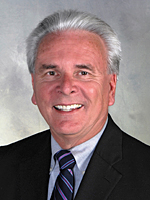
Dennis E. Warner
President and CEO In recognition of his technical and managerial leadership for numerous important engine programs for both defense and commercial applications Dennis Warner began working his way up the ranks at Rolls-Royce 43 years ago, right after his freshman year at Purdue. Then, as a co-op student studying aeronautics and astronautics, he traded semester spots in the classroom with industry stints in Indianapolis. Now, as the president and CEO of Aero Engine Controls (AEC) North America, part of a worldwide jointventure company between Rolls-Royce and Goodrich Corp. that formed in 2009, the on-the-job tutelage seems to have served him well. Under Warner’s leadership, AEC North America continues to grow in size and in capability as it provides engine control systems engineering services and products for Rolls- Royce propulsion and power systems. Building an organization consisting of 25 percent employees who are two years or less out of prominent engineering universities such as Purdue, the company has doubled in size. Throughout various leadership positions at Rolls-Royce, Warner has weathered the storms of both the economy and a changing industry. “I’ve seen a lot of change from a national infrastructure turning into more of a commercial and business-driven industry,” he says. “Some things that were government-sponsored in the past have become more of a competitive, commercial environment. That’s somewhat true with the aerospace part of it, but it’s definitely true of the defense aerospace part of it.” Warner has played a pivotal role in the development, production and aftermarket support for aircraft applications worldwide. At the turn of the century, he was the program manager for the Lift-Fan during the Joint Strike Fighters (JSF) program concept demonstration phase. There, Warner’s team developed this critical element as part of the central innovative STOVL (short takeoff/vertical landing) propulsion system in the JSF, the country’s next-generation fighter. He continues to motivate others to engineering greatness. “There’s the drive to do something difficult, to stand up an organization in a time where financial situations would say you shouldn’t be starting a new business venture,” Warner says. “It’s also nice to be able to encourage a young workforce to participate in an industry, the aerospace industry, as companies face the pressures of defense spending reductions and increased commercial competition.” As for his own motivation in pursuit of two Purdue engineering degrees, Warner says his undergraduate years in the School of Aeronautics and Astronautics provided him with a good view of what industry was about. While obtaining his master’s from the School of Mechanical Engineering, he turned his focus to the overall business environment. And he would recommend a cooperative education experience to any student. “You get to learn about industry as early as possible,” Warner says. “It may take an extra year to earn your bachelor’s degree, but you can look at the various disciplines and network with people. So you can tell from an early age whether you’re going to like something or not.” Career Highlights
|
